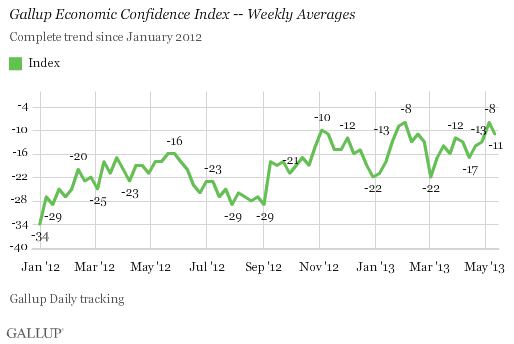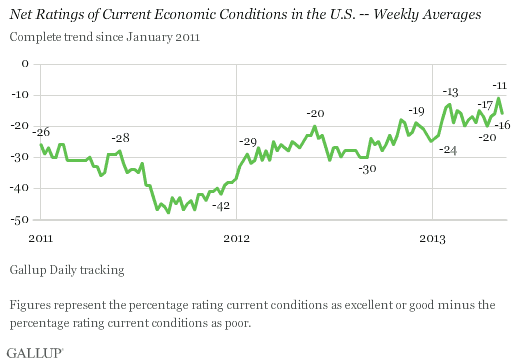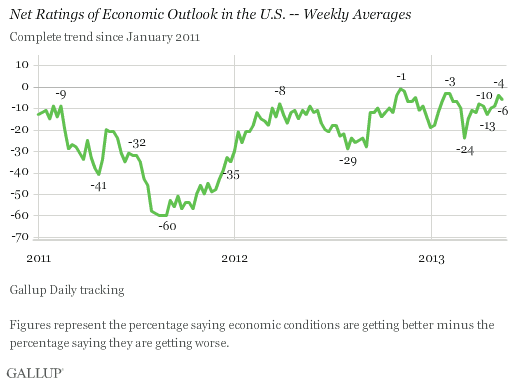WASHINGTON, D.C. -- Gallup's U.S. Economic Confidence Index fell slightly to -11 last week after tying the five-year weekly high of -8 the prior week and registering improvement for three straight weeks. Still, the current reading is one of the highest weekly scores of the year.

Americans' confidence in the economy has generally been stronger this year than it was in the previous few years. Gallup's Economic Confidence Index averaged -14 for the first quarter of this year, compared with the 2012 yearly average of -21. The index in the second quarter of 2013 has averaged -12 to date, suggesting that Americans are growing somewhat more confident in the economy this quarter.
The index is based on Americans' ratings of current economic conditions in the United States as well as their assessments of whether the economy is getting better or worse. Americans' assessments of current economic conditions as well as the future economic outlook fell slightly last week.
Americans' net current conditions rating decreased to -16 from -11 the prior week, but remains toward the higher end of the range recorded this year. Last week's reading reflects 19% of Americans saying the economy is excellent or good and 35% saying it is poor.

Americans' assessments of the economy's direction slipped slightly last week to a net score of -6 from -4 the prior week. Last week's reading reflects 44% of Americans saying the economy is getting better and 50% saying it is getting worse. Americans have been more likely to say the economy is getting worse than getting better in each weekly average since Gallup began Daily tracking in 2008.

Bottom Line
Although the Gallup Economic Confidence Index fell slightly last week, Americans' confidence in the economy remains stronger this year than it has been over the last several years. This improvement is likely a result of higher stock values, increased home values, and lower gas prices. Still, the index score has quickly retreated both times it reached the five-yearly weekly high this year, and has never been in positive territory since Gallup began Daily tracking of economic confidence in 2008.
Americans will likely need to see sustained improvement in their employment situation before economic confidence enters positive territory.
Gallup.com reports results from these indexes in daily, weekly, and monthly averages and in Gallup.com stories. Complete trend data are always available to view and export in the following charts:
Daily: Employment, Economic Confidence, Job Creation, Consumer Spending
Weekly: Employment, Economic Confidence, Job Creation, Consumer Spending
Read more about Gallup's economic measures.
View our economic release schedule.
Survey Methods
Results for this Gallup poll are based on telephone interviews conducted May 6-12, 2013, on the Gallup Daily tracking survey, with a random sample of 3,553 adults, aged 18 and older, living in all 50 U.S. states and the District of Columbia.
For results based on the total sample of national adults, one can say with 95% confidence that the margin of sampling error is ±2 percentage points.
Interviews are conducted with respondents on landline telephones and cellular phones, with interviews conducted in Spanish for respondents who are primarily Spanish-speaking. Each sample of national adults includes a minimum quota of 50% cellphone respondents and 50% landline respondents, with additional minimum quotas by region. Landline telephone numbers are chosen at random among listed telephone numbers. Cellphone numbers are selected using random digit dial methods. Landline respondents are chosen at random within each household on the basis of which member had the most recent birthday.
Samples are weighted to correct for unequal selection probability, nonresponse, and double coverage of landline and cell users in the two sampling frames. They are also weighted to match the national demographics of gender, age, race, Hispanic ethnicity, education, region, population density, and phone status (cellphone only/landline only/both, cellphone mostly, and having an unlisted landline number). Demographic weighting targets are based on the March 2012 Current Population Survey figures for the aged 18 and older U.S. population. Phone status targets are based on the July-December 2011 National Health Interview Survey. Population density targets are based on the 2010 census. All reported margins of sampling error include the computed design effects for weighting.
In addition to sampling error, question wording and practical difficulties in conducting surveys can introduce error or bias into the findings of public opinion polls.
For more details on Gallup's polling methodology, visit www.gallup.com.
